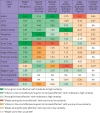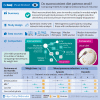Comparison of dietary macronutrient patterns of 14 popular named dietary programmes for weight and cardiovascular risk factor reduction in adults: systematic review and network meta-analysis of randomised trials
- PMID: 32238384
- PMCID: PMC7190064
- DOI: 10.1136/bmj.m696
Comparison of dietary macronutrient patterns of 14 popular named dietary programmes for weight and cardiovascular risk factor reduction in adults: systematic review and network meta-analysis of randomised trials
Erratum in
-
Comparison of dietary macronutrient patterns of 14 popular named dietary programmes for weight and cardiovascular risk factor reduction in adults: systematic review and network meta-analysis of randomised trials.BMJ. 2020 Aug 5;370:m3095. doi: 10.1136/bmj.m3095. BMJ. 2020. PMID: 32759278 Free PMC article. No abstract available.
Abstract
Objective: To determine the relative effectiveness of dietary macronutrient patterns and popular named diet programmes for weight loss and cardiovascular risk factor improvement among adults who are overweight or obese.
Design: Systematic review and network meta-analysis of randomised trials.
Data sources: Medline, Embase, CINAHL, AMED, and CENTRAL from database inception until September 2018, reference lists of eligible trials, and related reviews.
Study selection: Randomised trials that enrolled adults (≥18 years) who were overweight (body mass index 25-29) or obese (≥30) to a popular named diet or an alternative diet.
Outcomes and measures: Change in body weight, low density lipoprotein (LDL) cholesterol, high density lipoprotein (HDL) cholesterol, systolic blood pressure, diastolic blood pressure, and C reactive protein at the six and 12 month follow-up.
Review methods: Two reviewers independently extracted data on study participants, interventions, and outcomes and assessed risk of bias, and the certainty of evidence using the GRADE (grading of recommendations, assessment, development, and evaluation) approach. A bayesian framework informed a series of random effects network meta-analyses to estimate the relative effectiveness of the diets.
Results: 121 eligible trials with 21 942 patients were included and reported on 14 named diets and three control diets. Compared with usual diet, low carbohydrate and low fat diets had a similar effect at six months on weight loss (4.63 v 4.37 kg, both moderate certainty) and reduction in systolic blood pressure (5.14 mm Hg, moderate certainty v 5.05 mm Hg, low certainty) and diastolic blood pressure (3.21 v 2.85 mm Hg, both low certainty). Moderate macronutrient diets resulted in slightly less weight loss and blood pressure reductions. Low carbohydrate diets had less effect than low fat diets and moderate macronutrient diets on reduction in LDL cholesterol (1.01 mg/dL, low certainty v 7.08 mg/dL, moderate certainty v 5.22 mg/dL, moderate certainty, respectively) but an increase in HDL cholesterol (2.31 mg/dL, low certainty), whereas low fat (-1.88 mg/dL, moderate certainty) and moderate macronutrient (-0.89 mg/dL, moderate certainty) did not. Among popular named diets, those with the largest effect on weight reduction and blood pressure in comparison with usual diet were Atkins (weight 5.5 kg, systolic blood pressure 5.1 mm Hg, diastolic blood pressure 3.3 mm Hg), DASH (3.6 kg, 4.7 mm Hg, 2.9 mm Hg, respectively), and Zone (4.1 kg, 3.5 mm Hg, 2.3 mm Hg, respectively) at six months (all moderate certainty). No diets significantly improved levels of HDL cholesterol or C reactive protein at six months. Overall, weight loss diminished at 12 months among all macronutrient patterns and popular named diets, while the benefits for cardiovascular risk factors of all interventions, except the Mediterranean diet, essentially disappeared.
Conclusions: Moderate certainty evidence shows that most macronutrient diets, over six months, result in modest weight loss and substantial improvements in cardiovascular risk factors, particularly blood pressure. At 12 months the effects on weight reduction and improvements in cardiovascular risk factors largely disappear.
Systematic review registration: PROSPERO CRD42015027929.
© Author(s) (or their employer(s)) 2019. Re-use permitted under CC BY-NC. No commercial re-use. See rights and permissions. Published by BMJ.
Conflict of interest statement
Competing interests: All authors have completed the ICMJE uniform disclosure form at www.icmje.org/coi_disclosure.pdf (available on request from the first author) and declare: no support from any organisation for the submitted work. BS reports funding from Mitacs Canada in the past three years, and the International Life Sciences Institute (ILSI), North America to support his graduate work for his 2015 academic year (the ILSI funding is outside the required three year period requested on the ICJME form). In 2016-17, BS worked for the Cornerstone Research Group, a contract research organisation. AS reports personal fees from Dalhousie University. RTT reports grants from Sanofi Canada, outside the submitted work. As part of his recruitment to Texas A&M University, BCJ receives funds from Texas A&M AgriLife Research to support investigator initiated research related to saturated and polyunsaturated fats. Support from Texas A&M AgriLife institutional funds are from interest and investment earnings, not a sponsoring organisation, industry, or company. BCJ also received funding in 2015 from ILSI (outside the required three year period requested on ICJME form) to assess the methodological quality of nutrition guidelines dealing with sugar intake using internationally accepted GRADE (grading of recommendations, assessment, development, and evaluation) and AGREE (appraisal of guidelines for research and evaluation) guideline standards. The authors conducted the review of methodological quality of nutrition guidelines independently without involvement of the funder. No other relationships or activities that could appear to have influenced the submitted work.
Figures







Comment in
-
Comparative weight loss with popular diets.BMJ. 2020 Apr 1;369:m1269. doi: 10.1136/bmj.m1269. BMJ. 2020. PMID: 32238348 No abstract available.
References
-
- World Health Organization. Obesity and overweight, Fact sheet. 2018. https://www.who.int/mediacentre/factsheets/fs311/en/
-
- Jensen MD, Ryan DH, Apovian CM, et al. American College of Cardiology/American Heart Association Task Force on Practice Guidelines. Obesity Society 2013 AHA/ACC/TOS guideline for the management of overweight and obesity in adults: a report of the American College of Cardiology/American Heart Association Task Force on Practice Guidelines and The Obesity Society. Circulation 2014;129(Suppl 2):S102-38. 10.1161/01.cir.0000437739.71477.ee. - DOI - PMC - PubMed
Publication types
MeSH terms
Substances
LinkOut - more resources
Full Text Sources
Medical
Research Materials
